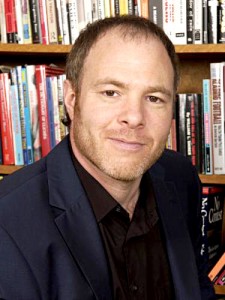
According to activist Jackson Katz, who spoke Tuesday night in Lindsay Auditorium, gender violence is not simply a women’s issue.
The lecture was held as part of Sexual Assault Awareness Week, held on campus last Monday through Friday, which was organized by various campus organizations including Rape Assistance and Awareness Program (RAAP), Rape Awareness and Gender Education (RAGE), the Center for Advocacy, Prevention & Empowerment (CAPE) and the DU Health and Counseling Center.
April is Sexual Assault Awareness Month (SAAM), and the organizations hoped to draw attention to gender violence through a series of events according to CAPE Program Director Gillian Kaag.
According to the National Sexual Violence Center, the goal of SAAM is to raise public awareness about sexual violence and to educate communities and individuals on how to prevent sexual violence.
“We want to both increase awareness and help foster a sense of respect,” said Kaag. “We’re also hoping to move from awareness toward prevention.”
Katz, a leading male voice in discourse on gender violence, is an educator, author, filmmaker and social theorist who co-founded the Mentors in Violence Prevention (MVP) program, the most widely utilized gender violence prevention program in college and professional athletics.
His lecture centered on men’s role in gender violence, and the structures and conventions present in modern American society that perpetuate aggressive male behavior towards women.
Lindsay Auditorium was filled to the brim with a variety of students, some there for class credit, others out of interest and curiosity. Although the majority of audience members were women, there were a number of male attendees.
“I’m going to begin tonight by arguing that we need a paradigm shift in our thinking about issues that have historically been understood as women’s issues … sexual violence, sexual harassment, domestic violence, sexual abuse of children—that whole range of issues that are referred to in shorthand as gender violence issues have been seen as women’s issues that some good men help out with,” said Katz. “But I’m here to say that I have a problem with that frame and I don’t accept it. I don’t see these issues as women’s issues that some good men help out with. I’m going to argue that these are men’s issues first and foremost.”
Katz’s lecture was passionate and articulate, and in his speech he sped up and stumbled slightly over words as they rushed forth. His body language had a sense of urgency to it, and his face reddened slightly in moments of particular consequence.
His discussion addressed representations of men and women in media, and use of passive language that eliminates men from the gender violence discussion.
“Men have been rendered largely invisible and yet so much of this is about men,” he said. “The invisibility cloak, in a sense, plays a political function to keep accountability off of men.”
Katz emphasized that the majority of his interest was on perpetrators, rather than victims. His interest is in uprooting structures and attitudes which, on a very fundamental level, contribute to the prevalence of gender violence.
He encouraged male audience members to challenge the notion of what it means to be a man in America, and hold male associates accountable for disparaging behavior or attitudes towards women.
Katz expressed that the majority of his mentors were women.
“Feminists have faith in us that we can be better men,” he said. “We need to raise the bar a little higher for what it means to be a good guy in the U.S. in the twenty-first century rather than just saying ‘I’m not a rapist.’”
Audience members laughed at this frank observation, finding humor in the accuracy of a troubling reality.
Katz was distinctly aware of the language he used in discussing these issues, and even conveyed a rejection of the phrase “Sexual Assault Awareness Month.”
“We’ve had awareness for decades. We need to go the next step,” he said.
He concluded the lecture with a loaded statement:
“I think equality between the sexes is our only hope for salvation as a species,” said Katz.
The lecture was followed by a ‘Take Back the Night’ walk and candlelit vigil. Students marched through campus to highlight the efforts of the week, chanting.
“Claim our bodies, claim our right, take a stand, take back the night,” the campus echoed.
Sexual Assault Awareness Week also included events such as Denim Day on Wednesday, where students wore denim to take a stand against sexual violence, the Consent is Sexy Carnival on Thursday and “A Memory, A Monologue, A Rant and a Prayer” in the Driscoll Ballroom on Saturday evening











